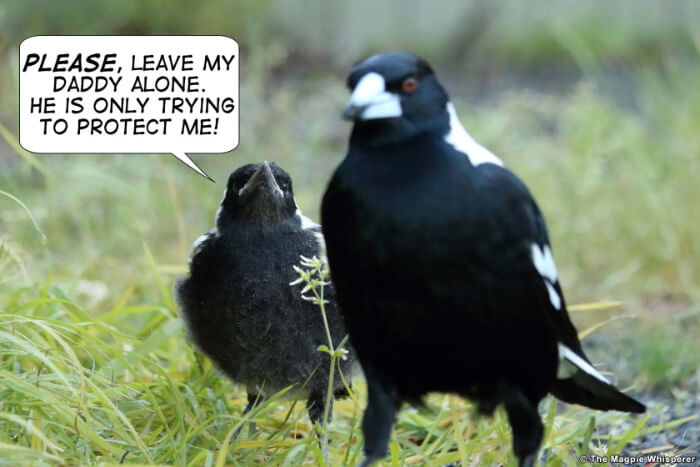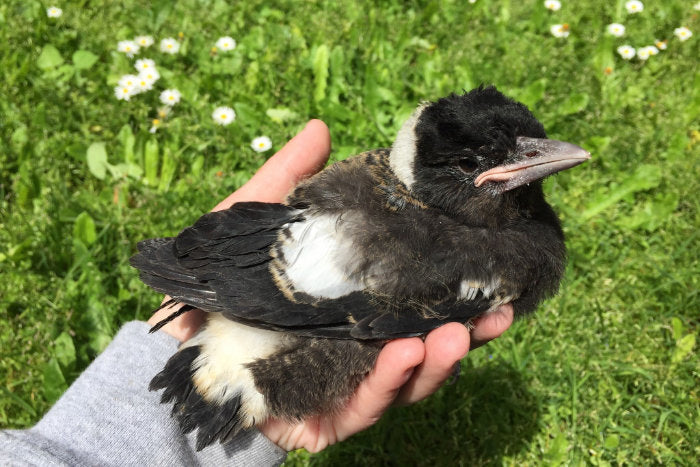Protecting Wildlife: A Comprehensive Guide to Rodenticides and Safer Alternatives
Posted by The Magpie Whisperer on
 Magpie Eating Mouse © Joshua Hodgson
Magpie Eating Mouse © Joshua Hodgson
Are you facing a rodent problem? It is well known that mice and other rodents can cause significant damage to property, contaminate food sources with their droppings, and spread dangerous diseases in the area. To control their population in places like your home, business, or public areas in your neighbourhood, many people resort to pest control techniques such as the application of rodenticides, commonly known as rodent poisons. However, using these methods to control rodent populations can lead to more severe problems for innocent animals like family pets or wildlife. This phenomenon is known as "secondary poisoning".
What Are Rodenticides?
Rodenticides are chemicals that kill rodents by targeting their central nervous system, causing death through hemorrhaging, dehydration, or other means. These substances come in various forms such as baits, pellets, blocks, and powders. When rodents ingest these chemicals, they become toxic to their predators, who may eat them, leading to a condition known as secondary poisoning. This can cause an agonising death and a range of health issues for animals that consume another animal exposed to rodenticides.
Secondary Poisoning: Effects on Non-Target Animals

One of the main risks associated with the use of rodenticides is secondary poisoning, which can have a significant impact on Australian wildlife. Many predatory species, such as birds of prey and snakes, rely on rodents as a primary food source. However, when these animals consume rodents that have ingested rodenticides, they can suffer from severe symptoms such as internal bleeding, weakness, and impaired vision. This can ultimately lead to death or long-term health effects.
It's not just larger predators that are affected by secondary poisoning. Even small nocturnal animals, such as moths and insects, feed on the carcasses of poisoned rodents, putting them at risk of exposure to the chemicals. This can cause a chain reaction, as these animals may become prey for other predators, leading to a widespread impact on the ecosystem.
In addition to wildlife, pets are also at risk of secondary poisoning from rodenticides. Dogs and cats may accidentally ingest the chemicals while hunting or playing with rodents that have been poisoned. The symptoms of poisoning in pets can range from mild to severe, depending on the dose and the type of rodenticide involved.
Symptoms of Poisoning On Non-Target Animals

It is crucial to be aware of the risks associated with rodenticides and the potential for wildlife or pet poisoning. These products can cause severe health issues, making it essential to recognise the symptoms and seek prompt treatment. Factors such as the type of poison ingested, amount consumed, and animal species affected can all affect the symptoms, making diagnosis challenging. This can lead to a delay in proper treatment, further complicating the situation. Therefore, it is imperative to contact a veterinarian or wildlife expert as soon as possible if poisoning is suspected. Early detection and treatment can make a significant difference in saving the animal's life.
Some common symptoms of rodenticide poisoning in wildlife and pets may include:
-
Internal bleeding: Certain rodenticides operate by preventing blood clotting, which can trigger internal bleeding in animals that consume them. Such symptoms can cause anemia, weakness, and pale gums.
-
Neurological problems: Rodenticides can interfere with the nervous system, leading to symptoms such as tremors, seizures, and impaired coordination.
-
Respiratory problems: Rodenticide can damage the lungs, causing inflammation and difficulty breathing. The animal may experience coughing, wheezing, and shortness of breath, and in severe cases, respiratory distress or failure.
-
Digestive issues: Rodenticides can also cause digestive problems such as vomiting, diarrhea, and loss of appetite, making it challenging for animals to consume food and maintain nutrition.
-
Weakness and lethargy: Animals affected by rodenticide poisoning may become weak and lethargic, impairing their ability to hunt, mate and protect themselves from predators.
- External bleeding: The internal bleeding caused by rodenticides can result in bleeding from the mouth, nose, rectum, or other areas of the body. However, bleeding from the mouth is not always present and may not be a consistent symptom across all cases of rodenticide poisoning.
Exploring Alternative Approaches to Rodent Control
Exclusion Sealing
 Exclusion sealing is a crucial step in preventing rodents from invading homes. This process involves sealing off all possible entry points and gaps that rodents can use to gain access to the interior of the house. Some common entry points for rodents include cracks in the foundation, gaps around utility lines, and holes in exterior walls.
Exclusion sealing is a crucial step in preventing rodents from invading homes. This process involves sealing off all possible entry points and gaps that rodents can use to gain access to the interior of the house. Some common entry points for rodents include cracks in the foundation, gaps around utility lines, and holes in exterior walls.To effectively seal these entry points, different materials can be used depending on the size and location of the gap. For smaller gaps and cracks, caulking material or expandable foam sealants can be used to create a tight seal. These materials are easy to apply and can be found at most hardware stores.
For larger openings, steel wool or fine wire mesh can be used to cover the gap. These materials act as a physical barrier that prevents rodents from entering the home. Additionally, mice do not like chewing on steel wool or wire mesh, so it serves as a good deterrent.
Some of the most effective exclusion methods include:
- Patching up cracked concrete foundations or walls
- Sealing up gaps around plumbing and electrical penetrations
- Weather-stripping doors and windows
- Installing door sweeps on exterior doors which do not make contact with the threshold
- Sealing air ducts securely
Rodent Traps
| 💡 It is crucial to place traps in areas that are inaccessible to wildlife and pets to avoid unintentional harm. Regularly checking the traps is also vital to ensure that any trapped rodents are removed promptly, minimising their suffering. |
Live traps are good for people who prefer a humane method of trapping rodents and releasing them back into the wild. They are usually cage-like structures that capture rodents without harming them. The traps usually come with bait, which is used to lure the rodents inside, and once triggered, a door shuts, trapping the rodent inside. Live traps are highly regarded as an ethical solution to rodent control issues and are often used by animal rights organisations and individuals alike.
Snap traps, on the other hand, have been in use for centuries and are probably the most common type of trap available for rodent control. They are efficient and lethal, and the rodent is usually killed instantly when the trap is triggered. Although they are not widely considered humane, snap traps are an effective way of instantly eliminating rodents from your area. They are cheap to purchase, easy to set up, and can be used for both indoor and outdoor rodent control.
Why We Should Avoid Using Glue Traps

Bird stuck on glue trap. Photo - Claira Hollins
Using glue traps also puts unintended animals at risk, such as birds, reptiles, and pets. This can be distressing for both the trapped animal and its owner, making the use of glue traps an unacceptable and inhumane practice.
Choosing more humane pest control methods can help prevent unnecessary suffering. By opting for humane pest control methods, we can protect both wildlife and pets and create a more compassionate and ethical environment.
Peppermint Oil and White Vinegar
Peppermint oil and white vinegar have strong scents that rodents find unpleasant. Studies have shown that rodents avoid areas where peppermint oil has been applied, making it an effective natural deterrent.
The most effective way to use peppermint oil and vinegar is to soak cotton balls in the mixture and place them strategically around your home, making sure that pets do not have access to the cotton balls. It is recommended to place the cotton balls near entryways, cracks, and gaps where rodents are likely to enter. You can also use a spray to apply the mixture around the perimeter of your home. Peppermint oil can even be added to your cleaning solutions to keep rodents away from your home.
Plant Some Herbs

To establish a landscape to help deter a rodent invasion, consider planting specific types of vegetation that are known to repel rodents. Mint, lavender, thyme, sage, basil, and rosemary are examples of fragrant herbs that release odours that rodents find unpleasant.
By adding a variety of these herbs to your garden, you not only create a beautiful landscape but also a natural barrier against rodent infestations.
In addition to their natural repellent properties, these herbs can also provide other benefits to your garden. For example, basil is not only a natural repellent for rodents, but it also attracts beneficial insects such as bees and butterflies, which can help pollinate your garden.
It's important to note that while planting these herbs can be effective in deterring rodents, it may not be a completely foolproof method on its own.
Electronic Repellents
If you don't want to use poisons or traps to control rodents, you can try using electronic repellents instead. These devices emit high-pitched frequencies that are unpleasant for rodents, but are too high for humans to hear. They can be placed around your home or garden to create an environment that is less welcoming to rodents. While electronic repellents are generally safe for humans and pets, there is some debate about their effectiveness.
Cleanliness Measures
Maintaining a clean and tidy environment is key in keeping rodents at bay. By keeping areas free of food waste and maintaining cleanliness, we can help eliminate potential food sources and reduce the likelihood of a rodent infestation. Additionally, keeping living and storage areas clean and clutter-free is important, as it removes potential hiding spots and breeding grounds for rodents.
Cats

If you have a cat that loves to hunt, chances are you won't have to worry about a rodent issue in your home. Cats are natural predators of rodents, and their presence alone can be a deterrent for these pests. Rodents instinctively avoid areas where they can sense predators nearby, and the scent of a cat can be enough to keep them away.
Having a cat as a natural rodent deterrent can be particularly useful for preventing rodents from entering your home or building. When rodents sense the presence of a predator like a cat, they are less likely to approach or try to enter the area.
However, it's important to note that not all cats are natural hunters, and some may not be interested in chasing rodents at all.
Therefore, while having a cat can be a helpful tool in preventing rodent infestations, it should not be relied on as the sole method of rodent control.
Call in the Professionals
If you want to take extra precautions, consider calling in professionals and expressing your concerns about using rodenticides. They can provide alternative methods for controlling rodent populations, such as traps or exclusion techniques, that may be more in line with your values and preferences.
Pest control companies have experience dealing with rodent infestations and can spot signs of a problem before it becomes too advanced. They can also provide preventative plans to help keep rodents at bay. Additionally, professional cleaning services can ensure that your space is thoroughly cleaned, leaving no hiding spots for rodents. By taking these measures, you can have peace of mind that you're doing all you can to keep rodents away.
Protecting our Wildlife: Together, We Can Make a Difference!
 All of us play a crucial role in preserving our beautiful wildlife. By taking the time to educate ourselves about the risks associated with rodenticides and making small changes to prevent secondary poisoning, we can have a huge impact on the health and well-being of our ecosystems.
All of us play a crucial role in preserving our beautiful wildlife. By taking the time to educate ourselves about the risks associated with rodenticides and making small changes to prevent secondary poisoning, we can have a huge impact on the health and well-being of our ecosystems.
As proud Australians, we cherish our unique wildlife, and it's up to us to be informed about the dangers of rodenticides and help our wildlife in need. Don't forget that even small actions can make a big difference!
Let's keep spreading the word about this important issue and encourage others to get involved. Together, we can create a safer and healthier environment for all wildlife.
💬 Do you have any tips or tricks to keep rodents away? We'd love to hear from you in the comments below!



